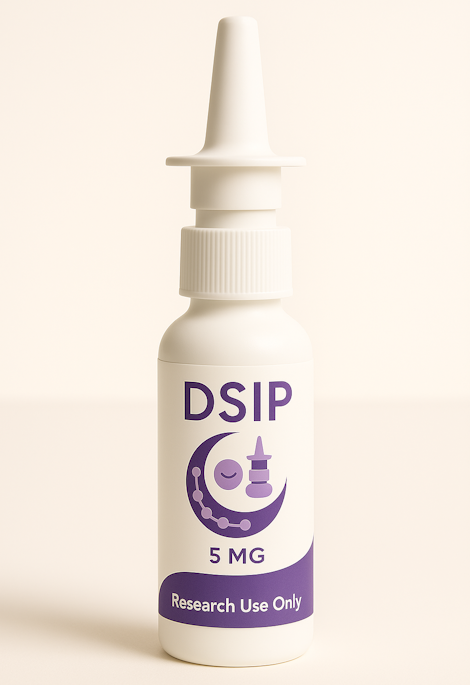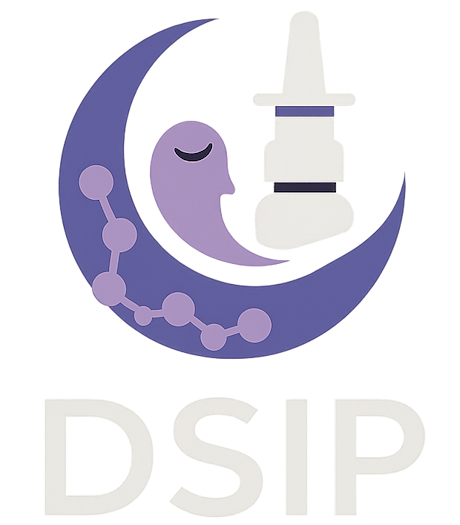DSIP Nasal Spray: A Comprehensive Guide To The Sleep-Inducing Peptide

In the ever-evolving world of peptide therapy, Delta-Sleep Inducing Peptide (or DSIP) is gaining increased interest among researchers and biohackers alike. Known for its potential in improving sleep regulation, stress reduction, and restorative sleep, this formulation of Delta Sleep Inducing Peptide offers a non-invasive method of administration through a nasal spray. While not yet approved for medical use, the peptide is sold for research purposes and research applications, demonstrating intriguing outcomes in animals, SD rats, and early human observations.
To explore how DSIP dosing, benefits, and safety vary across delivery methods, check out our detailed guides on DSIP Peptide Dosage Chart: The Ultimate Guide For Men & Women and DSIP Nasal Spray vs Injections: Similarities & Differences.
What is DSIP?
DSIP, short for Delta Sleep Inducing Peptide, is a naturally occurring neuropeptide first isolated in the 1970s. Despite being widely studied, the physiological functions of this peptide are not yet fully understood. Found in the central nervous system and various peripheral tissues, this peptide appears to modulate a variety of multivariate functions related to sleep, stress, and brain activity.
Early studies by Schoenenberger GA and others suggested that it plays a role in delta wave activity, crucial for slow wave sleep—the deepest, most restorative sleep stage. This has led to increased research into this peptide as a tool to enhance sleep quality, stabilize sleep patterns, and minimize sleep disturbances.
Advantages Of Nasal Spray Vs. Injections
The innovation of DSIP administered via nasal spray provides a convenient route of delivery compared to injectable forms. When delivered intranasally, it’s absorbed through the nasal mucosa into the bloodstream, allowing for quicker access to the brain and the central nervous system. This delivery method is appealing to researchers studying its potential benefits in regulating circadian rhythm and improving sleep efficiency.
This peptide is sold as a research chemical, not as a pharmaceutical-grade medication. It is intended for research applications, often in academic or clinical settings exploring the peptide’s effect on neurotransmitter levels, stress, and chronic pain.
Delta Sleep Inducing Peptide and Sleep Optimization
One of the core areas of DSIP research is its interaction with sleep, particularly in individuals suffering from poor sleep quality . Studies indicate that delta sleep is essential for brain detoxification, memory consolidation, and hormonal balance. Researchers have demonstrated its influence on enhancing slow wave sleep, which leads to improved sleep quality and restorative sleep.
In individuals suffering from insomnia, poor sleep quality, or sleep disorders, disrupted sleep patterns and reduced sleep efficiency are often observed. Its modulation of cortisol—the body’s primary stress hormone—may contribute to more stable sleep cycles and a reduction in sleep disturbances.
A number of researchers, including Mikhaleva II, have investigated how it can improve sleep regulation in both animals and human subjects. While findings are still preliminary, many studies have demonstrated improved sleep latency, duration, and reduced nighttime awakenings in patients using this peptide.
Stress Reduction and Cortisol Regulation
Chronic stress is a common contributor to sleep disturbances and poor health. DSIP’s interaction with cortisol and the hypothalamic-pituitary-adrenal (HPA) axis positions it as a potential peptide for stress reduction. By promoting relaxation and reducing cortisol spikes before bedtime, use of this peptide may assist in achieving deeper, more restorative sleep.
This peptide has also shown benefits in regulating stress in laboratory rats, which are often used to model the peptide’s effects on neurotransmitter levels and hormone production. These studies further validate its influence on emotional symptoms, such as anxiety and stress-induced insomnia, and may also have implications in brain infarction recovery .
Research Applications in Pain, Stroke, and Brain Health
Beyond sleep, this peptide is also being studied for its role in managing chronic pain, stroke, and cardiovascular health. In rodent models, it has been associated with improved motor function after focal stroke and reduced infarct size in brain infarction studies.
Some animal trials suggest this peptide may enhance recovery following myocardial infarction, and in certain cases, DSIP like material may even reduce myocardial infarction occurrence when stress is a contributing factor. Although more evidence is needed, the research presents a compelling argument for further exploration.
Studies also explore DSIP like peptides, such as the DSIP like KND peptide, which share structural similarities and could help elucidate its broader biological interactions and physiological functions.
Curious about the potential advantages beyond sleep? Read 12 Surprising DSIP Peptide Benefits You Probably Didn’t Know.
Potential Benefits of This Peptide
While this peptide is sold for research purposes, the list of potential benefits being investigated is expanding, indicating its promise in treatment applications.
- Enhanced sleep regulation and circadian rhythm
- Improved sleep quality and increased sleep efficiency
- Reduction in chronic pain symptoms
- Stabilization of neurotransmitter levels
- Improved motor function following stroke
- Stress reduction and relaxation
- Increased slow wave sleep and restorative sleep
These potential benefits make this peptide a compelling candidate in the field of peptide therapy, especially for patients with persistent insomnia, chronic pain, or sleep disturbances that don’t respond well to traditional medications.
Research and Safety Considerations
While DSIP holds promise, it’s critical to note that all formulations, especially the nasal spray version, are currently intended only for research applications. There is no FDA approval for human treatment, and it should not be used as a cure for any disease.
Because peptide stability and storage are critical, instructions should be followed carefully. Many suppliers recommend refrigeration and outline proper dosing procedures. Researchers are encouraged to consult all safety guidelines before beginning studies with this, or any other peptide.
Importantly, interactions between this peptide and other medications have not been extensively studied, which underscores the importance of using this peptide only under qualified supervision for research purposes.
For a breakdown of the most common side effects and how to minimize them, visit DSIP Peptide Side Effects: 5 Most Common (& How To Lessen Them).
Frequently Asked Questions
Q: What is DSIP nasal spray?
DSIP nasal spray is a formulation of Delta Sleep Inducing Peptide designed for intranasal delivery. It is primarily used in research settings to explore its potential effects on sleep regulation, stress reduction, and neuroendocrine function. The peptide is believed to promote slow wave sleep and improve sleep quality without the sedative drawbacks of traditional sleep medications.
Q: Is Dymista nasal spray a steroid?
Yes, Dymista nasal spray contains two active ingredients: azelastine hydrochloride (an antihistamine) and fluticasone propionate (a corticosteroid). It is used to treat seasonal allergic rhinitis by reducing inflammation and allergy symptoms in the nasal passages.
Q: Does it make you sleepy?
It does not act like a traditional sedative but may promote sleep by influencing delta wave activity in the brain. Its role in enhancing slow wave sleep and regulating circadian rhythms may lead to improved sleep onset and depth, but it doesn’t typically cause immediate drowsiness like conventional sleep aids.
Q: How long does it take for it to kick in?
The onset of DSIP effects can vary depending on the individual and method of administration. When administered via nasal spray, users in research settings often report effects within 30 to 60 minutes, particularly in terms of relaxation and improved ability to fall asleep. However, more consistent results may be observed with regular use over several days.
Availability and Shipping for Researchers
DSIP is readily available online and often sold in research-only formats. Reputable sources provide fast shipping and secure checkout processes. Products intended for laboratory use typically come with COAs (Certificates of Analysis) and detailed instructions for application.
While these formulations are not meant for consumer or clinical use, many researchers can easily pay and checkout via encrypted platforms and expect their order to ship within a few business days.
Conclusion
The nasal spray version of DSIP is an innovative formulation that has wide-ranging implications in sleep regulation, stress, chronic pain, and brain recovery. Though its physiological functions are not fully understood, studies involving SD rats, humans, and DSIP like material continue to uncover its potential benefits.
From enhancing slow wave sleep to improving motor function post-stroke, its future in peptide therapy remains bright—provided it is used appropriately for research purposes. With proper sourcing, storage, and usage under controlled conditions, this peptide could contribute significantly to the understanding and treatment of modern sleep and stress-related challenges.
For complete dosage guidance and best-use scenarios, refer to the DSIP Peptide Dosage Chart: The Ultimate Guide For Men & Women.
Discover the Key Benefits of DSIP Peptide Nasal Sprays
Dive deep into the science behind DSIP peptide nasal sprays. Learn how they work, proper usage, benefits, and precautions to make informed health choices with confidence.

